#I’m actually shocked that bbc radio 4 didn’t do this scene
Text

was this scene never adapted by anyone bc it’s too homosexual or bc no one could figure out whether holmes was joking or in actual distress
#it personally reads as him under distress to me#if that last line didn’t exist maybe I’d think otherwise#Sherlock Holmes#me posting crud#I’m actually shocked that bbc radio 4 didn’t do this scene#since coules intentionally added gay shit to things#unless I sleep through that part 😳 valley of fear mid#image
86 notes
·
View notes
Text
Media Rediscover Afghan Women Only When US Leaves
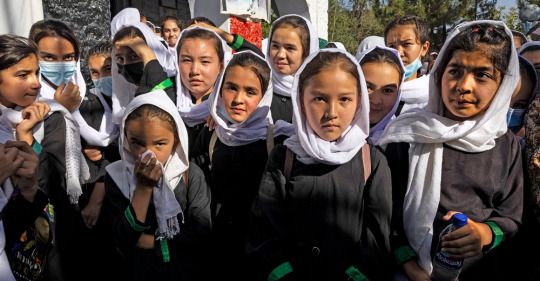
Just as US corporate news media “discovered” Afghan women’s rights only when the US was angling for invasion, their since-forgotten interest returned with a vengeance as US troops exited the country.
After September 11, 2001, the public was subjected to widespread US news coverage of burqa-clad Afghan women in need of US liberation, and celebratory reports after the invasion. Time magazine (11/26/01), for instance, declared that “the greatest pageant of mass liberation since the fight for suffrage” was occurring, as “female faces, shy and bright, emerged from the dark cellars” to stomp on their old veils. In a piece by Nancy Gibbs headlined “Blood and Joy,” the magazine told readers this was “a holiday gift, a reminder of reasons the war was worth fighting beyond those of basic self-defense” (FAIR.org, 4/9/21).
The media interest was highly opportunistic. Between January 2000 and September 11, 2001, there were 15 US newspaper articles and 33 broadcast TV reports about women’s rights in Afghanistan. In the 16 weeks between September 12 and January 1, 2002, those numbers skyrocketed to 93 and 628, before plummeting once again (Media, Culture & Society, 9/1/05).
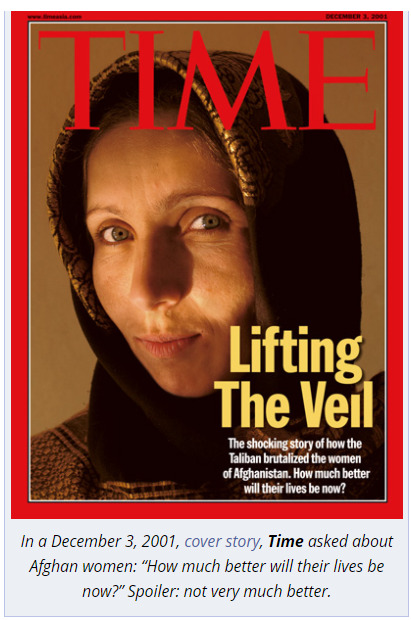
Suddenly remembering women
Now, as the US finally is withdrawing its last troops, many corporate media commentators put women and girls at the center of the analysis, as when Wolf Blitzer (CNN Situation Room, 8/16/21), after referring to “the horror awaiting women and girls in Afghanistan,” reported:
President Biden saying he stands, and I’m quoting him now, squarely, squarely behind this decision to withdraw US forces from Afghanistan, despite the shocking scene of chaos and desperation as the country fell in a matter of only a few hours under Taliban control, and the group’s extremist ideology has tremendous and extremely disturbing implications for everyone in Afghanistan, but especially the women and girls.
This type of framing teed up hawkish guests, who proliferate on TV guest lists, to use women as a political football to oppose withdrawal. Blitzer guest Rep. Adam Kinzinger (R.-Illinois), for instance, argued:
Look at the freedom that is being deprived from the Afghan people as the Taliban move into Afghan, or moving into parts of Afghanistan now, and you know how much freedom they had. Look at the number of women that are out there making careers, that are thought leaders, that are academics, that never would have happened under the Taliban leadership…. The devastation you are seeing today is why that small footprint of 2,500 US troops was so important.
Sen. Joni Ernst (R.-Iowa) gladly gave Jake Tapper (CNN Newsroom, 8/16/21) her take on the situation after CNN aired a report on the situation for women:
As you mentioned, for women and younger girls, this is also very devastating for them. The humiliation that they will endure at the hands of the Taliban all around this is just a horrible, horrible mar on the United States under President Joe Biden.
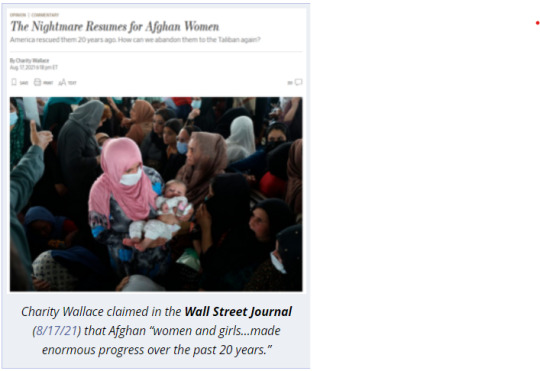
‘America rescued them’
Charity Wallace claimed in the Wall Street Journal (8/17/21) that Afghan “women and girls…made enormous progress over the past 20 years.”
Such analysis depends on the assumption that the US invasion and occupation “saved” Afghan women. In the Wall Street Journal (8/17/21), an op-ed by former George W. Bush staffer Charity Wallace ran under the headline : “The Nightmare Resumes for Afghan Women: America Rescued Them 20 Years Ago. How Can We Abandon Them to the Taliban Again?”
Two days later, a news article in the Journal (8/19/21) about the fate of women in Afghanistan explained: “Following the 2001 invasion, US and allied forces invested heavily to promote gender equality.”
The Associated Press (8/14/21), in a piece headlined, “Longest War: Were America’s Decades in Afghanistan Worth It?,” noted at the end that “some Afghans—asked that question before the Taliban’s stunning sweep last week—respond that it’s more than time for Americans to let Afghans handle their own affairs.” It continued, “But one 21-year-old woman, Shogufa, says American troops’ two decades on the ground meant all the difference for her.” After describing Shogufa’s experience for five paragraphs, the piece concludes with her “message to Americans”:
“Thank you for everything you have done in Afghanistan,” she said, in good but imperfect English. “The other thing was to request that they stay with us.”
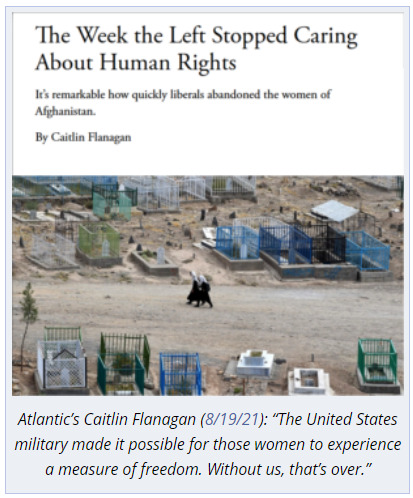
Perhaps the most indignant media piece about Afghan women came from Caitlin Flanagan in the Atlantic (8/19/21), “The Week the Left Stopped Caring About Human Rights.” Flanagan argued:
Leave American troops idle long enough, and before you know it, they’re building schools and protecting women. We found an actual patriarchy in Afghanistan, and with nothing else to do, we started smashing it down. Contra the Nation, it’s hard to believe that Afghan women “won” gains in human rights, considering how quickly those gains are sure now to be revoked. The United States military made it possible for those women to experience a measure of freedom. Without us, that’s over.
Flanagan pointed to Afghan activist Malala Yousafzai, whom she accused “critics of the war” of forgetting, saying Yousafzai “appealed to the president to take ‘a bold step’ to stave off disaster.”
Next to last in women’s rights
Such coverage gives the impression that Afghan women desperately want the US occupation to continue, and that military occupation has always been the only way for the US to help them. But for two decades, women’s rights groups have been arguing that the US needed to support local women’s efforts and a local peace process. Instead, both Democrat and Republican administrations continued to funnel trillions of dollars into the war effort, propping up misogynist warlords and fueling violence and corruption.
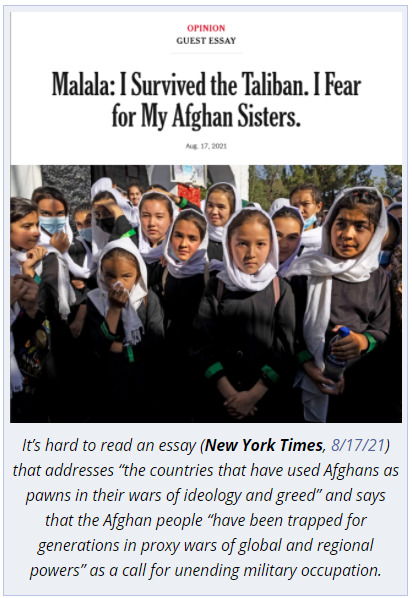
Contra Flanagan’s insinuation, Yousafzai didn’t ask Biden to continue the occupation. In an op-ed for the New York Times (8/17/21) that most clearly laid out her appeal, she asked for humanitarian aid in Afghanistan and for refugees fleeing the country. In fact, her take on the US occupation’s role in women’s rights (BBC, 8/17/21) is much more critical than most voices in the US corporate media: “There had been very little interest in focusing on the humanitarian aid and the humanitarian work.”
As human rights expert Phyllis Bennis told FAIR’s radio program CounterSpin (2/17/21), Malalai Joya, a young member of parliament, told her in the midst of the 2009 troop surge that women in Afghanistan have three enemies: the Taliban, warlords supported by the US and the US occupation. “She said, ‘If you in the West could get the US occupation out, we’d only have two.’”
Things did get better for some women, mostly in the big cities, where new opportunities in education, work and political representation became possible with the Taliban removed from power. But as Shreya Chattopadhyay pointed out in the Nation (8/9/21), the US commitment to women was little more than window dressing on its war, devoting roughly 1,000 times more funding to military expenses than to women’s rights.
Passive consumers of US corporate news media might be surprised to learn that Afghanistan, in its 19th year under US occupation, ranked second-to-last in the world on women’s well-being and empowerment, according to the Women, Peace and Security Index (2019).
As the Index notes, Afghan women still suffer from discriminatory laws at a level roughly on par with Iraq, and an extraordinarily low 12.2% of women reported feeling safe walking alone at night in their community, more than 4 points lower than in any other country. And just one in three girls goes to school.
Wrong kind of ‘help’
In 2015, a 27-year-old Afghan woman named Farkhunda Malikzada was killed by an angry mob of men in Kabul after being falsely accused of burning a Quran; US-backed Afghan security forces watched silently (Guardian, 3/28/15). The shocking story spread around the world, but the only US TV network to mention it on air was PBS (7/2/15), which offered a brief report more than three months after the murder, when an Afghan appeals court overturned the death sentences given to some of the men involved.
FAIR turned up no evidence of Caitlin Flanagan ever writing about Malikzada, either—or about the plight of any Afghan woman before last week.
According to a Nexis search, TV news shows aired more segments that mentioned women’s rights in the same sentence as Afghanistan in the last seven days (42) than in the previous seven years (37).
The US did not “rescue” Afghan women with its military invasion in 2001, or its subsequent 20-year occupation. Afghan women need international help, but facile and opportunistic US media coverage pushes toward the same wrong kind of help that it’s been pushing for the last two decades: military “assistance,” rather than diplomacy and aid.
For more than 20 years, US corporate media could have listened seriously to Afghan women and their concerns, bringing attention to their own efforts to improve their situation. Instead, those media outlets are proving once again that Afghan women’s rights are only of interest to them when they can be used to prop up imperialism and the military industrial complex.
2 notes
·
View notes
Text
Finally done waiting for Garridebs!
A rather self-indulgent retrospective of Tumblr fandom history
As many of you may know – or also already may have been looking forward to – another handful of Sherlock Holmes stories are about to enter the public domain in the United States, and therefore worldwide, on January 1, 2020:
The Illustrious Client
The Sussex Vampire
The Three Garridebs
This means that only six more stories still remain under copyright, with the last few finally falling into worldwide public domain on January 1, 2023.
Not quite unexpectedly, my focus in this little series of posts to celebrate the countdown to January 1 will lie on 3GAR – not only because the word "Garridebs" is literally part of my URL, and not even because of the quite literal cliffhanger we've been given in series 4,
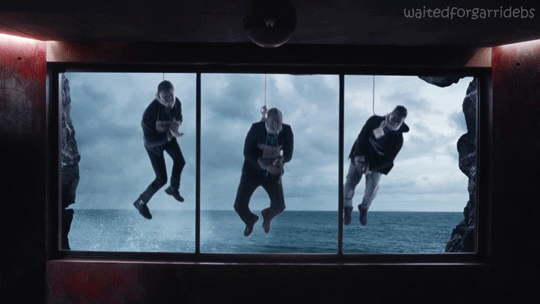
but – for anyone who doesn't know or needs reminding – because of the quote that started it all:
“Like most male friendships, everything is assumed, and nothing is spoken of.
Oh, except for once. Just once, and that’s your lot. If you’re going to read it in order, like I did, you’ve got a long time to wait for The Adventure of the Three Garridebs, but patience, and keep reading in order - you’ll be blinking back the tears when the moment comes.”
– Steven Moffat, Introduction to A Study in Scarlet (2011), BBC Books
The fandom has expected the adaptation of 3GAR in BBC Sherlock for a very long time – given that the moment Watson gets shot is the "only" time he can truly see that Holmes is human after all.
In an instant he had whisked out a revolver from his breast and had fired two shots. I felt a sudden hot sear as if a red-hot iron had been pressed to my thigh. There was a crash as Holmes’s pistol came down on the man’s head. I had a vision of him sprawling upon the floor with blood running down his face while Holmes rummaged him for weapons. Then my friend’s wiry arms were round me, and he was leading me to a chair.
“You’re not hurt, Watson? For God‘s sake, say that you are not hurt!”
It was worth a wound — it was worth many wounds — to know the depth of loyalty and love which lay behind that cold mask. The clear, hard eyes were dimmed for a moment, and the firm lips were shaking. For the one and only time I caught a glimpse of a great heart as well as of a great brain. All my years of humble but single-minded service culminated in that moment of revelation.
“It’s nothing, Holmes. It‘s a mere scratch.”
He had ripped up my trousers with his pocket-knife.
“You are right,” he cried with an immense sigh of relief. “It is quite superficial.” His face set like flint as he glared at our prisoner, who was sitting up with a dazed face. “By the Lord, it is as well for you. If you had killed Watson, you would not have got out of this room alive. Now, sir, what have you to say for yourself?”
In short: It is the perfect setup for a love confession.
Unsurprisingly this scene inspired the fandom to come up with the most emotional, dramatic, and oftentimes angst-filled headcanons possible.
And, boy, did we all not only deliver on this trope, we created this trope.
There are so many fanworks including the Garridebs scenario on here, on AO3, and elsewhere that one can't even count them all properly – and believe me, I've tried: This blog contains a collection of more than 800 Garridebs-related posts so far (and still counting!).
Over the years, we've had them all: The angsty confrontations. The standoffs and life-and-death scenarios.
Mary trying to shoot Sherlock, again, and John catching the bullet for him. Moriarty burning Sherlock's heart out by blowing up the building John is currently held hostage in. A burglar or murderer trying to get away, and knifing John in a struggle. Sherlock shooting John by accident. Sometimes, John deciding to end his own life after drowning in his own self-loathing and guilt (as well as a lot of alcohol).
We've had the reactions. The aftermaths.
Sherlock frantically rushing to John's side. In lighter scenarios, the occasional banter, sometimes even giggling. If they weren't so lucky, Sherlock desperately trying to keep John awake, to stop the bleeding by pressing onto John's wound with his own scarf – just like John taught him that one time. The John in Sherlock's mind palace appearing in the moment of emotional turmoil to calm Sherlock down, to talk him through it, to guide, and to comfort him. Sherlock calling Mycroft to scream and cry into his phone, begging– no, commanding his big brother to just DO something. The sirens of the ambulance finally being within earshot. Lestrade silently putting a blanket over Sherlock's shoulders as John gets taken to the hospital, while Sherlock’s doomed to do nothing. To just wait for things to come.
Sherlock frantically pacing up and down in the waiting room of the hospital, afraid to lose John, paralised in shock and fear, losing himself in the darkness of his own mind palace, until the doctors finally come out of the surgery to give him the news.
Sherlock not leaving John's bedside, waiting for hours and hours, wanting to be there when John wakes up, until he falls asleep with his head on John's mattress, overcome with relief and exhaustion.
John finally waking up only to see Sherlock sleeping soundly next to him, their fingers still intertwined. Sherlock startling awake the second he notices the change in John's breathing pattern, and John is looking at him drowsily, and they smile, and they both don’t know what to say, but it is okay, because John will be okay, and if John is okay, then Sherlock is also going to be okay, and Sherlock didn't even realise he's been babbling this out loud, until John tells him that he did, with the hint of a smile on his face that is almost fond, and Sherlock doesn't understand what this expression on John’s face could possibly mean.
John absentmindedly continuing to stroke the back of Sherlock's hand with his own thumb and not wanting to stop doing so any time soon.
Sherlock taking John to Baker Street, bringing him home, and finally they're back to what they used to be, but something's changed, and it's something so heavy and light at the same time, it makes them both relish this anticipation of a different future – their future – and John continues to heal, and Sherlock keeps looking after him, keeps changing the bandages, keeps making the tea, keeps picking trashy movies for them to watch while eating the Chinese takeout they ordered, until someday they gaze at each other just a little too long, they touch each other just a little too frequently, they hesitate to break the emotional tension for just the right amount of time, and the inevitable finally happens.
At least that's the case for all the times they manage to not be completely all over each other the moment they close the door to the flat when John comes home from the hospital.
Sometimes, it doesn't go all that smoothly. There's the fighting. The guilt. The regret. The times when Mary or the baby had to suffer as well. Sometimes they confess their feelings in a rage, by accident, but that's okay, and they will be okay, and they fall into each other, and they pull at each other's clothes, almost as if clinging to life itself, and they will be okay just as long as they're Them, as long as there's This.
There are the unusual scenarios as well. The surprising ones.
Sometimes Sherlock's the one to get shot instead of John. Sometimes it happens in Victorian times and Holmes cries out Watson’s first name. Sometimes John doesn't get physically hurt at all, and sometimes he stays behind maimed, the eyepatch now permanently being part of his wardrobe.
Sometimes one of them actually dies.
And sometimes, you think of a smutty Garridebs scenario you would like to write, until you realise that Mark Gatiss already did it for you in an adaptation of Dracula on BBC Radio 4 – no joke! (x)
What I'm trying to say is … it was quite a ride.
The best.
Honestly, I want to thank you all so much for these last few years. It was a blast, and I truly hope there's still many more fanfics, and fanart, and headcanons, and meta, and any other kind of fanwork to come.
However, this series is not going to be me rambling about what the fandom created here on Tumblr. I just had the need to recap, to reflect, and also to catch the new people up who've not been here while all of this unfolded.
But from here on we’re going back to when it all started:
Tomorrow we'll go into the history of the Holmesian side of things – and, lo and behold, of course the first post is going to be about the original canon story itself. After that, we'll dive deeper into all the other adaptations.
And I can’t wait to share all of this.
Update: Read the whole now completely published series of posts about the Garridebs adaptations here (x)!
207 notes
·
View notes